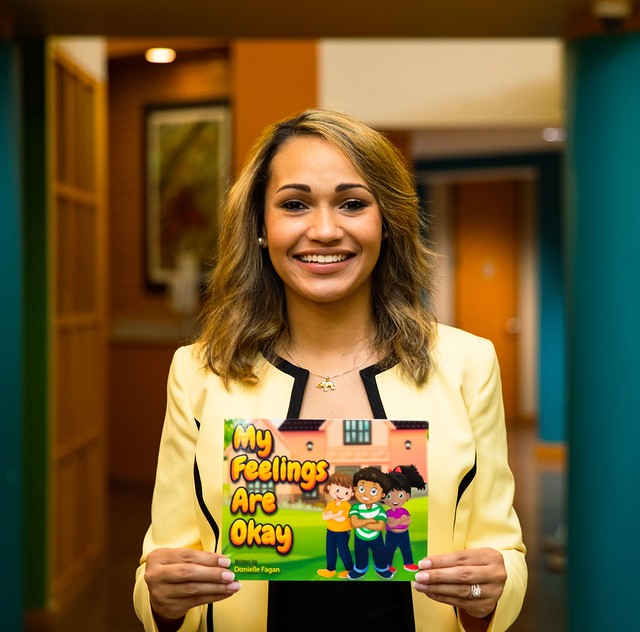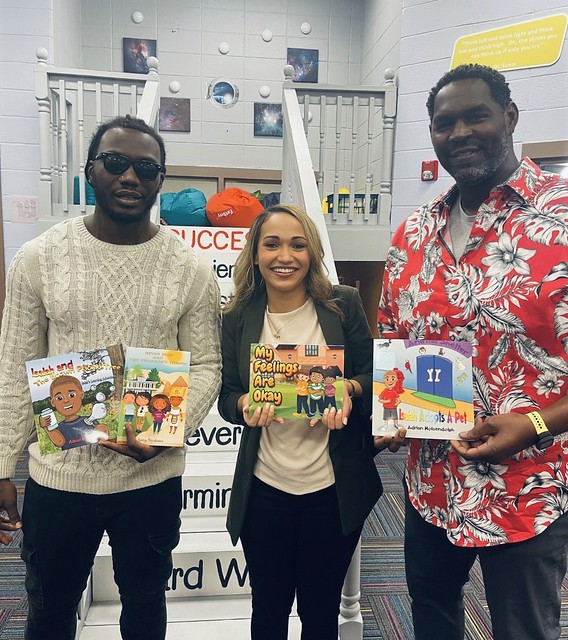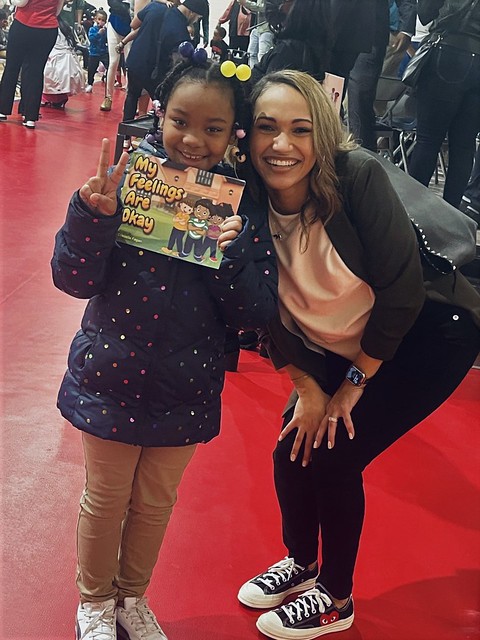Auburn College of Education doctoral student writes children’s book to teach coping skills
Article body
While pregnant with her first child last year, Donielle Fagan decided to write a love letter of sorts to her son in the form of a children’s book.
Fagan, a doctoral candidate in Auburn University’s College of Education, was thinking of a way to help children learn how to deal with their emotions. With her son, Jared—who was born in June—in mind, Fagan used her skills as an experienced counselor to craft helpful messages for youth about emotions ranging from anger, sadness and joy, to confusion, frustration and grief.
The result was a children’s book titled “My Feelings Are Okay,” a 24-page self-published book that aims to teach children that all the feelings they may experience are normal while providing tips for how best to deal with the varying emotions. She hopes to one day read it to her son and have him learn important lessons from the book.
“My book is a coping skills book for kids,” said Fagan, a doctoral intern at the Georgia Institute of Technology’s Counseling Center in Atlanta. “I was reflecting and gaining new insight about what it was going to be like to be a mom, and writing the book was something I did somewhat as a dedication to my son coming into the world. I thought it was important because coping is still something we aren’t doing really well just yet as a society.
“It’s teaching kids that it’s OK to have some of these certain feelings and is about engaging in emotion rather than avoiding emotion. The whole idea is that, if we engage in it, we develop this skill to cope and do well with whatever it is we’re experiencing.”
Fagan’s book, which was published in July and is available on Amazon.com, has been well-received. It was chosen for inclusion in the National Football League’s “Tackle Reading Day” on March 2, with Atlanta Falcons representatives reading the book to children at Heritage Academy.
“It was great, because I got to go to one of the classrooms as they read the book,” Fagan said. “I got some honest feedback from some students, and one second-grade student told me she appreciated it because it wasn’t something they talked about at home.
“There were a lot of community leaders from the Atlanta area who were there, and they had pep rallies and made the students feel excited and important. It was really special to see, and the kids loved it.”
Fagan’s experience and qualifications are varied. After earning a bachelor’s in psychology from Xavier University, she obtained a master’s in clinical psychology from Auburn University at Montgomery and another master’s in counseling from Auburn University. Those degrees helped propel her into Auburn’s counseling psychology doctoral program, and she expects to graduate this August after completing her internship at Georgia Tech and defending her dissertation.
The Birmingham, Alabama, native also has private practice experience working with troubled juveniles and has taught classes at Auburn throughout her time in graduate school. Fagan’s practical experience helped shape her messages in the book.
“I was dealing with juvenile offenders who had disorders and who were behavioral concerns, and one thing I saw across the board was an inability to cope or to cope in a healthy way,” said Fagan, who will perform clinical and private practice work after graduating. “In the book, I basically pair a coping skill with each emotion, and developmentally, it’s supposed to help them as they go into later adolescence and adulthood.”
A writer for more than a decade, she also relied on knowledge acquired from her extensive education, especially in the Auburn system, while working on the book.
“The counseling psych program and [Department of Special Education, Rehabilitation and Counseling] SERC Department is phenomenal,” said Fagan, who hopes to again teach at the college level one day. “The type of training I’ve received from Auburn has been A-1, in terms of exposure, integration, experience, resources and support. Having a lot of people pour into me as an individual has helped me pour into other areas and help others.
“My parents and in-laws all graduated from Alabama, and Auburn wasn’t in my path. But I found myself at Auburn, and it has been one of the greatest decisions I’ve ever made.”
The book, she says, is a message to her son and other children about the best ways to manage emotions and feelings. Fagan said the added stress everyone has experienced during the COVID-19 pandemic also prompted her to sit down and write the book.
“It’s been hard for us to even process as adults, and the pandemic has been a lot for a child to process,” Fagan said. “I think one thing everyone has experienced is isolation, and recognizing that we’re social beings who really need each other is important. That’s really healthy for us, and just the fact that the pandemic changed our environments—especially for kids being unable to interact or bond with each other—that’s a lot to cope with as a kid.
“We can’t control the pandemic, but what we can control is the impact of that pandemic. Mental health and coping in general are very important and things we need to continue to focus on and destigmatize.”
Her book also has been distributed to elementary and middle school children in the Atlanta Public School System, and Fagan hopes its reach continues to grow.
“My hope is that it becomes the go-to coping skills book for kids,” she said. “This is something we need that’s simple, but also vital, too. I want it to be something that’s passed down through generations and that is talked about in people’s households.”
Related Media
Media interested in this story can contact Communications Director Preston Sparks at (334) 844-9999 or preston.sparks@auburn.edu.
Auburn University is a nationally ranked land grant institution recognized for its commitment to world-class scholarship, interdisciplinary research with an elite, top-tier Carnegie R1 classification, life-changing outreach with Carnegie’s Community Engagement designation and an undergraduate education experience second to none. Auburn is home to more than 30,000 students, and its faculty and research partners collaborate to develop and deliver meaningful scholarship, science and technology-based advancements that meet pressing regional, national and global needs. Auburn’s commitment to active student engagement, professional success and public/private partnership drives a growing reputation for outreach and extension that delivers broad economic, health and societal impact.








